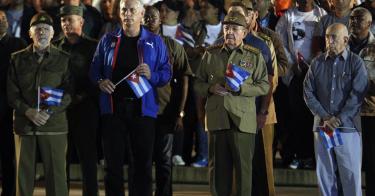This week will see a historic transfer of power in Cuba. On Thursday, for the first time since the 1959 revolution, Cuba will have a leader whose last name is not Castro.
But this change does not arise as the result of free and fair elections. Three generations into the revolution, Cubans are still deprived of that right. So instead they will witness an illegitimate transfer of power from one ruthless leader to another.
The regime’s apologists will herald the transition as a new era for Cuba. In reality, the only thing they are celebrating is biology.
At almost 87 years old, Raul Castro is the world’s fifth-oldest ruler. His hand-picked successor is rumored to be regime loyalist and current Vice President Miguel Diaz-Canel.
There should be no illusions about Mr. Diaz-Canel, 58. He cut his teeth under the leadership of both Castro brothers, and he shares their outdated and repressive perspective on governance.
In a video leaked last year, Mr. Diaz-Canel disparaged Cuba’s dissidents and political prisoners as counterrevolutionaries. He also claimed that he would censor independent media, the internet and other means of free expression.
In that same video, Mr. Diaz-Canel goes on to criticize countries such as Germany, Norway, Spain, the United Kingdom and, of course, the United States for their “subversive” support of human rights. Clearly, he is a dyed-in-the-wool Castro communist.
And even after Mr. Diaz-Canel claims the title of president, Mr. Castro will not amble off into a benign retirement. He will continue to be a guiding voice within the regime as the ideological leader of Cuba’s ruling Communist Party.
Time and time again, regime apologists have been wrong about the future of Cuba. When Mr. Castro took over from brother Fidel in 2008, they claimed Raul would evolve “from enforcer to reformer.” It never happened.
Richard Feinberg, a senior fellow with the Brookings Institution, is quite sympathetic with the Castro regime. Yet even he has observed: “In many ways, Raul Castro’s 10-year presidential rule, ending in February 2018, has been utterly disappointing. Cuba’s economy is stagnant and economic reform has stalled. Political power remains highly centralized and secluded.”
President Obama’s much-lauded Cuba policy was supposed to shepherd in a new era. Yet that initiative also failed to bring meaningful change to the island.
Mr. Obama’s three years of unconditional concessions to the regime undermined U.S. national security objectives and foreign policy interests. Meanwhile, the Castro regime stubbornly refused to change either its anti-American behavior or its repressive practices in exchange for Mr. Obama’s loosening of the U.S. trade embargo.
Cuba remains a nation that fails to provide property rights protections or fair courts for the just resolution of economic disputes. And going into business in Cuba still largely means “partnering” with commercial wings of the Cuban military, security or intelligence services. Political and religious persecution continues, as well.
It seems safe to say that nothing will change under Mr. Diaz-Canel. Had Cuba wanted to signal a commitment to reform, last week’s 8th Summit of the Americas in Peru was the prime opportunity. Instead, pro-Castro thugs attacked Cuban human-rights activists and U.S. citizens. Cuban civil society members were held hostage on the island and were unable to attend the gathering. The Cuban delegation also shut down the civil society meeting at the summit.
U.S. policymakers should take this opportunity to review the best course of action toward Cuba. The efficacy of the U.S. trade embargo deserves vigorous debate, but it would be flawed and illogical to presume that a unilateral lifting of sanctions would make matters better.
While Mr. Diaz-Canel and Mr. Castro have different last names, they seem to share the same political DNA. U.S. policymakers should condemn this illegitimate transfer of power, and weigh a variety of options to help bring real reform to the island at last.
This piece originally appeared in the Washington Times



